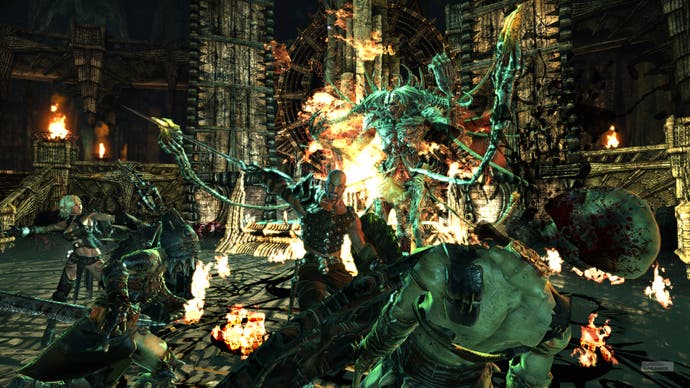Hunted: The Demon's Forge
Brian Fargo's inXile resurrects the dungeon crawler.
"The other big idea that makes our co-op different is the fact that our characters are not carbon copies of each other," he points out. "We've ended up with this idea of switching at checkpoints; no one has really done that before because the characters are exactly the same. You don't have to switch."
This is where the way Hunted straddles the character action game and the co-op RPG makes things a little sticky. Playing through the campaign in single-player or co-op, you'll be able to switch between the characters at will to enjoy both perspectives on the admirably meaty combat. But you, as a single player, will "own" both characters and be able to make talent-tree purchasing skills for both, with all crystals shared between both. It's a different situation either to being able to step into the cloned boots of an identikit future warrior, or to bringing your own individually nurtured RPG characters together to fight alongside each other.
InXile's solution is fair, if not that easy to explain. An elaborate match-making system ("we've been researching dating sites") will bring players with sutiable play-styles, a preference for a particular character, or a game save at around the same spot together. Joining a host's game, you'll either be able to bring your own character in or use theirs. In the former situation, you make your own advancement choices but the host earns an equivalent pool of crystals to spend later; in the latter, the host makes the choices for you, and you get crystals to take home to your own game. Co-op is jump-in, jump-out, and available both online and locally.
Back in the fray, Elara and Caddoc ("there's a bit of sexual tension, but also a little sister, big brother thing") are pinned down by a catapult in an open clearing, a giant viaduct towering over them and framing a misty mountain vista - just because it's a dungeon crawl, it doesn't have to be dank. Vocal cues bounce back and forth letting you know what your partner is up to - handy if you don't have voice chat - and visual cues help figure out a solution to the situation, a stray catapult missile shaking a scaffolded statue to indicate that it's unstable.

Caddoc pushes it over and into the viaduct, spectacularly toppling the whole edifice on top of the catapulter. It's only one way past this area, though, we're told. "We've set this up so there are multiple ways to play it," says Fargo. "That's very RPG-ish, right? But it has nothing to do with statistics. We're trying to pull the things that give a sense of depth."
Paramount among those things are loot, secrets, riddles and exploration, and despite the blockbusting action focus of this demo, we're reassured that these are all high priorities for the Hunted team. There'll be a good deal to discover beyond a straight run through the main story, from lore - a "death stone" lets you hear the histories of corpses, filling in a 500-year saga - to puzzles. The latter will be 40 per cent easy, 40 per cent challenging and 20 per cent "very, very difficult", with naturally some tasty weapons and gold ot be had for your perserverance.
Just like they used to make. Hunted's a gold rush as old as them thar hills, then, even though it presents itself as the model of a modern major videogame, complete with blood-smear health guage, crunching cut-away execution moves and pithy script. Although its title and look locate it firmly in the musty dungeon of fantasy, its brisk action and smart co-op mechanics could genuinely find a new audience for the oldest game in the book. There's something tremendously comforting about that.
"It's the genre that created the industry," Findley sums up. "In the beginning, these were the only games that existed."
Hunted: The Demon's Forge will be released for PC, Xbox 360 and PS3 in 2010.

